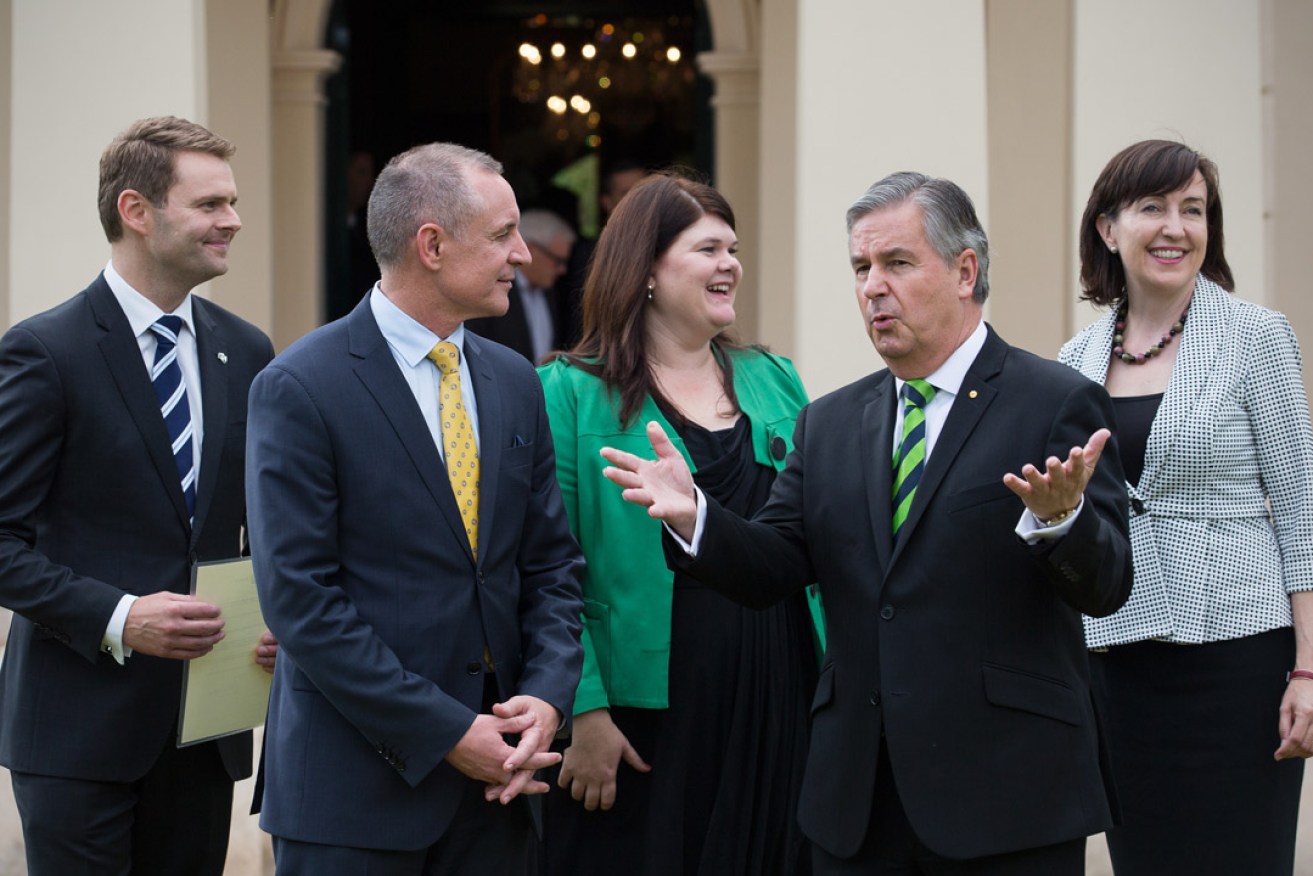Off the Bench: It’s Back to the Future with the Libs
In our opinion series Off the Bench, two of South Australia’s brightest backbench MPs – one Labor, one Liberal – trade arguments on key issues. Today, Labor MP Chris Picton argues that targets alone won’t increase the number of women in politics.

'Labor's action is working': Premier Jay Weatherill and former SA Governor Kevin Scarce with new cabinet members Stephen Mullighan, Zoe Bettison and Susan Close after their swearing-in last year.
It’s fitting that last week we celebrated “Back to the Future Day”, because Stephan Knoll’s article yesterday on women in politics could have been written back in 1985.
A male MP asking a question like, “Do women want to go into politics in the first place?” needs to be back in the last century, where it belongs.
Women – just like men – are not some sort of homogenous group. Every person is different. No one is saying that every woman wants to go into politics – just that the thousands who do should be given a fair opportunity.
Labor has taken action on this; the Liberals have not.
I’m obviously a bloke and not qualified to offer personal experience on this subject, but I respond by pointing out the clear facts on why action was – and is – necessary.
In South Australia, we celebrate that we were the first place in the world where women had the right to run for Parliament – and rightly so. However, in the 120 years since, our state hasn’t elected nearly enough women.
It took SA more than 60 years to elect its first female politicians – Joyce Steele and Jessie Cooper – and another six years for the third (and first from Labor), Molly Byrne.
Since then, the only significant progress has been in the past 20 years – and then only from the Labor side.
In the 1990s, Labor had this debate and took action to guarantee a proportion of women were elected. Before that, we had only five female MPs out of our sizable caucus. They were great representatives, but five was too few.
Twenty-five years on, how many women does the Liberal Party have in Parliament? Five. The same number as Labor a generation ago.
In comparison, Labor’s action is working and we are now lucky to have 11 strong, capable female MPs.
But perhaps the Liberals are improving slowly without action? There’s sadly no evidence of that.
Over the past 18 months there’s been six new Liberal MPs elected. “New blood”, they say. But it’s an all-male contingent. Not a single female coming up through the ranks. It is pretty embarrassing.
Even if the Liberals happened to have won another five seats (as Steven Marshall predicted he would), there would have been nine new men and two new women.
The Liberals’ low number of female MPs contributes to South Australia having the lowest percentage of female MPs of any parliament in the nation.
Ultimately, whether the Liberal Party decides to take affirmative action or not is a matter for them. As I look at the talented women on our side of the Parliamentary chamber, and the has-been blokes on their side – it is clear to me that if they don’t take action then it will be to their own downfall. I don’t think it helps their chances of ever hoping to form government again one day.
I wish action was not needed and we had an equal society. We do not. Women still encounter sexism. Women are still paid less in the workforce – even for the same jobs. And we still don’t have enough women in leadership – politics or business. Pretending that the issues confronting women are done and dusted is farcical.
The lack of women in parliament isn’t due to women lacking the desire, lacking merit or lacking support from the voters. The biggest reason that so few women were elected has been because it has been more difficult to be given the nod inside political parties.
Stephan wants to see more women in politics. So do I. Stephan wants to see more sponsors and mentors for women. So do I.
What we disagree on is whether a non-binding target will achieve anything. I believe that the evidence shows that a target won’t work alone.
I would not argue that a quota is a perfect mechanism – far from it. In fact there’s a number of female Labor MPs who don’t prefer quotas. But it is a pragmatic, accelerated solution to a problem ingrained over centuries. No one has come up with a better solution.
The stupidest argument against taking action is that it would stop MPs being elected on “merit alone”. What a joke. That argument assumes that all past and present politicians are the best and the brightest!
When I sit in Parliament I directly face the Liberal MPs. As I scan across their flooded backbench of male MPs, “merit” is not the word that comes to mind.
Compared to the male Liberal MPs past their time – a few new female Liberal MPs would be far more effective in developing policies and solutions for our state.
Chris Picton is the Labor Member for Kaurna. He was chief of staff to Australia’s first female Attorney-General.




